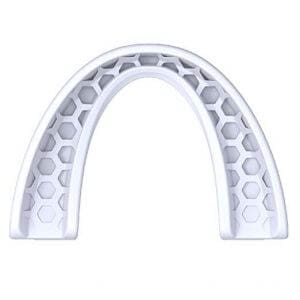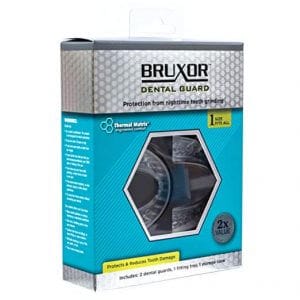A Review of The Bruxor® Dental Guard for Bruxism (Teeth Grinding)
What is bruxism? Bruxism is a condition where one grinds, gnashes, or clenches their teeth. This may be done during waking hours presented as clenching and during sleep by unconsciously clenching or grinding the teeth.
Bruxism may be caused by stress and anxiety, however, it can also be caused by a sleep disorder, such as sleep apnea, when occurring during sleep. Persons with an abnormal bite, missing, or crooked teeth may be at risk for bruxism due to the facial discrepancies also causing a small airway. Tooth clenching is also a normal reaction to pain in the body.

Some people may be unaware of grinding their teeth, especially during sleep. However, others may wake with a dull, constant headache, sore teeth, and/or sore jaw which are common signs of bruxism. Also, people may be told they have bruxism by their bed partner who hears the grinding at night.
In some cases, chronic teeth grinding can result in fracturing, loosening, or loss of teeth requiring dental restorations such as root canals, crowns, bridges, implants, partial or complete dentures. Not only can bruxism damage teeth, but it can also affect the jaw joints that attach the and hearing changes, to name a few.
If you suspect you may be grinding your teeth, it is recommended to have some type of mouth guard or oral appliance to protect the teeth. You may talk to your dentist about a custom-made device or try an over-the-counter mouthguard.
If while wearing any mouthguard, whether over the counter or custom made, symptoms become worse such as increased or new pains, there are some mechanisms that may occur and cautions to be aware of. For instance, the mouthguard may change where the lower jaw normal lines up and has the potential to lead to jaw popping or clicking, jaw pain, or bite changes. If this occurs, use of the mouthguard should be discontinued.
If the tooth grinding is related to sleep breathing such as sleep apnea, there is a chance that a single arch mouth guard could make the symptoms worse. If you find that you grind your teeth more with the appliance or feel like you are choking during the night, it could be causing the lower jaw and/ or tongue to move back toward the throat and make the airway more crowded.
Use of the mouthguard should be discontinued and you should seek an opinion with a sleep physician or dentist trained in sleep breathing disorders.
There are several options for over-the-counter mouthguards for tooth grinding and clenching and we evaluated the reasonably priced Bruxor® Dental Guard, available online. Bruxor® Dental Guard is intended to protect teeth and reduce the damage caused by bruxing, or nighttime teeth grinding, and to prevent the noise associated with bruxing and grinding.
For those who are patient, the ordering process for a custom-molded dental guard may have very real long-term benefits. You’ll send in an “oral profile” kit that allows Bruxor to build out a guard that fits your chompers like a glove.

One product description found on Amazon for Bruxor® Dental Guard is as follows: “Bruxor acts as a protective layer between your top and bottom teeth by absorbing the tension caused by night time grinding and clenching.
This dispersion of force wears down your night guard rather than your enamel. It’s slim and lightweight is comfortable to wear and allows you talk and breathe through your mouth.”
The FDA approved device is nicely packaged and comes with instructions, two mouthguards, a fitting tray, and a protective case. The easy to follow and pictorial instructions for the Bruxor® Dental Guard recommend molding to the upper teeth.
However, due to the size of the mouthguard, it may have to be fitted to the lower teeth for some patients with wide upper arches.
It was noted that during the molding process there is some excess boil and bite material which squeezes out over the appliance and could irritate the lips, cheeks, or tongue. Although the instructions do not state, the material is soft enough that it may be trimmed with a sterilized cuticle or other small sharp scissors if rubbing occurs on the mouth tissues.
The design of the appliance is lightweight, which helps with retention and staying in all night to protect the teeth. The guard is also BPA and latex free for sensitive and allergic people.
Wearing a mouthguard for bruxism may not completely eradicate symptoms however it is great at protecting the teeth. In addition to a dental guard, people who are stressed should seek counseling or try to make positive changes to relieve the stress. For patients who clench from chronic pain, they should try to address the root causes and be sure to exercise and eat right.
Overall, the Bruxor mouthguard is a great product for the price, has easy to follow instructions, and is lightweight and comfortable. With any mouthguard, if symptoms do not improve or worsen, use should be discontinued.


